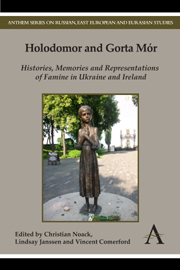Book contents
- Frontmatter
- Contents
- List of Figures
- Acknowledgements
- Introduction Holodomor and Gorta Mór: Histories, Memories and Representations of Famine in Ukraine and Ireland
- Part I Histories, Historiography and Politics
- Chapter 1 Holodomor in Ukraine 1932–1933: An Interpretation of Facts
- Chapter 2 Ethnic Issues in the Famine of 1932–1933 in Ukraine
- Chapter 3 Grievance, Scourge or Shame? The Complexity of Attitudes to Ireland's Great Famine
- Part II Public Commemoration
- Part III Trauma and Victimisation
- Part IV New Sources and New Approaches to the Irish and Ukrainian Famines
- Index
Chapter 3 - Grievance, Scourge or Shame? The Complexity of Attitudes to Ireland's Great Famine
from Part I - Histories, Historiography and Politics
Published online by Cambridge University Press: 05 May 2013
- Frontmatter
- Contents
- List of Figures
- Acknowledgements
- Introduction Holodomor and Gorta Mór: Histories, Memories and Representations of Famine in Ukraine and Ireland
- Part I Histories, Historiography and Politics
- Chapter 1 Holodomor in Ukraine 1932–1933: An Interpretation of Facts
- Chapter 2 Ethnic Issues in the Famine of 1932–1933 in Ukraine
- Chapter 3 Grievance, Scourge or Shame? The Complexity of Attitudes to Ireland's Great Famine
- Part II Public Commemoration
- Part III Trauma and Victimisation
- Part IV New Sources and New Approaches to the Irish and Ukrainian Famines
- Index
Summary
Is then our Isle of Heaven accursed and banned,
That all desert her thus? Perish the thought!
Not in such spirit read we Erin's lot;
Full often is adversity's chill breath
More precious than the wealth of India's mine,
High is the comfort of the text divine:
‘Whom the Lord loveth, them He chasteneth!'
The Great Irish Famine occurred in a highly politicised country with a well advanced system of communications, a literacy rate of about 50 per cent, a universally spread local and state bureaucracy and considerable openness to the press, domestic and foreign. Accordingly, it is well documented and extensively remembered. However, both documentation and remembering are incomplete and fragmented in ways that suggest reticence and ambivalence. The Great Famine as national grievance is well posted; but the totality of contemporary response and later remembrance and interpretation is much less clear-cut, incorporating elements of anger, providentialism, embarrassment, guilt and, of course, incomprehension in fluctuating combinations. The present chapter is intended as a tentative exploration of this complexity and of its reflection in history writing. Only limited reference is made to the thriving literary and cultural study of the Great Irish Famine pioneered by Margaret Kelleher, Christopher Morash and others.
- Type
- Chapter
- Information
- Holodomor and Gorta MórHistories, Memories and Representations of Famine in Ukraine and Ireland, pp. 51 - 74Publisher: Anthem PressPrint publication year: 2012
- 1
- Cited by

